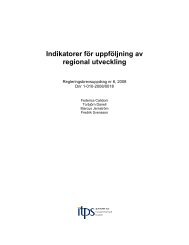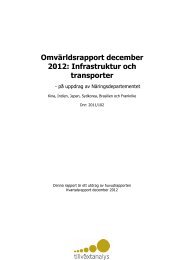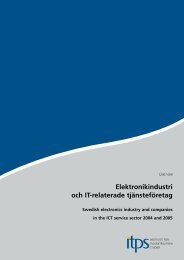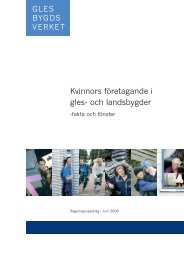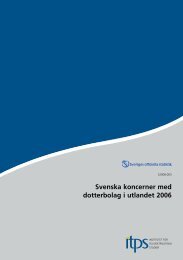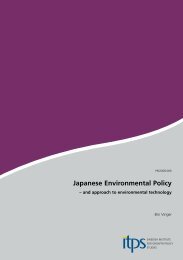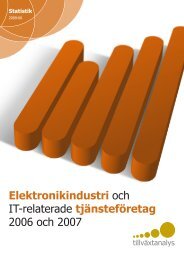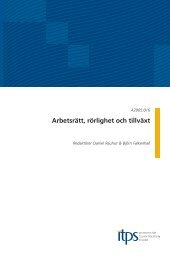Samhällsekonomiska aspekter och mått på hållbar utveckling
Samhällsekonomiska aspekter och mått på hållbar utveckling
Samhällsekonomiska aspekter och mått på hållbar utveckling
Create successful ePaper yourself
Turn your PDF publications into a flip-book with our unique Google optimized e-Paper software.
Summary<br />
Sustainable development is the overall goal of Swedish government policy as it is for<br />
development within the EU. This means that economic growth should be sustainable in<br />
the long-term.<br />
In practice, economic policy has always been about how we can best husband our resources,<br />
of which nature has traditionally been one of the most important, and generate<br />
welfare for ourselves, our fellow humans and generations to come. However in their<br />
pursuit of welfare, humans have been so “successful” that we have caused such interference<br />
with nature that this now threatens to have negative effects on growth and the<br />
welfare of coming generations. So far, growth has been partly based on the fact that we<br />
have been living on our capital, not just on the interest on this capital.<br />
This report aims to provide an introduction to how the concept of sustainable development<br />
is defined and applied within economic research. Another aim is to set out a schematic<br />
summary of research literature within this research field over the past three years.<br />
The report has been produced on behalf of the Swedish government that commissioned<br />
ITPS to put together a synthesis of the research literature on growth. ITPS has elected<br />
to subdivide this assignment into sub projects. This report presents the findings of the<br />
sub study into sustainable development.<br />
Summary of chapter 2 – Socio-economic aspects and measures<br />
of sustainable development<br />
Ever since the concept of sustainable development was introduced at the end of the<br />
1980s, economists have sought to define, operationalise and find ways to measure<br />
whether or not development is sustainable, and if so, to what degree.<br />
In this process, environmental economics, a branch of economics, has been inspired by<br />
ecological perspectives and led to the discipline of ecological economics, which has<br />
roots in both economics and ecology.<br />
From an economics perspective, this has resulted in more in-depth knowledge of the<br />
function of ecological systems, systems that are an important production factor in the<br />
form of natural capital through so-called ecosystem services, functions and processes<br />
that, from a human exploitation perspective, comprise goods and services from nature,<br />
forest products, watering (the hydrological cycle) etc. This has in its turn led to the<br />
broadening of the concept of capital to include various kinds of natural capital. Widening<br />
the concept of capital and focusing on long-term sustainable growth also entails<br />
refining our view of productivity and robust growth.<br />
13





